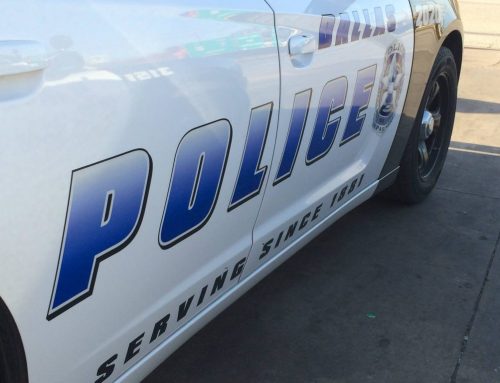Each month, the Advocate visits with Sgt. Jim Little, Sr. Cpl. Pam Maines, Sr. Cpl. Rick Janich and Officer T.X. “Tri” Ngo of the East Dallas Storefront police station, 1327 N. Peak Street (670-5514). The Storefront is best-known for its bicycle patrol officers, who pedal the streets of East Dallas weekdays. The City of Dallas funds the Storefront, but numerous volunteers and organizations provide both hours and funds to develop special programs aimed at building better relations among police officers and neighborhoods. (Editor’s Note: Maines did not attend this month’s lunch; she was attending another meeting.)
Advocate: What has been going on during the past month?
Rick: We’ve just been real busy – two crack cocaine and one cocaine arrest in the last couple of weeks. We’ve got about one every week. One arrest was on East Side and one was on Sycamore.
This guy was on his bicycle, and we came around the corner on the bikes, and he had this crack cocaine in his hand. He was holding it out to his buyers. When they saw us, the buyers scattered, and he popped the coke (wrapped in plastic) into his mouth.
I had him open his mouth, and you could see the packages bulging out, but he wouldn’t spit them out, so we had to try and extract them. We ended up fighting with him, and after a couple of minutes – it took us that long to get him under control – he spit it out.
Advocate: This may be a dumb question, but do you need a warrant to search someone’s mouth?
Rick: We had seen it (the crack) in there, so we didn’t. We had a good idea what it was and where it was.
Advocate: What happens to the guys you arrest for possession?
Rick: We test the substance to make sure it’s cocaine. Then, the suspect is arraigned, and if he has any bond money, he gets out. If he doesn’t, he sits in jail until the trial.
Advocate: What type of person have you typically been arresting for drug possession?
Rick: We had one 14-year-old kid we stopped with 18 rocks of crack.
Advocate: What is a rock worth on the street?
Tri: About $10.
Jim: The adult with him (the youth) had $1,200 cash on him. We’ve got kids delivering drugs on bicycles, on skateboards…
Rick: The drug dealers know that nothing serious is going to happen to the juveniles (in the court system), so that’s why they use the kids.
Advocate: I suppose it must get a little tiring hauling them in and having the courts turn them right back out on the street.
Jim: The voters, when they vote for somebody, it sure would be nice if they would check the records of judges before they vote. We had a judge who was finally defeated, but just about every marijuana (possession) case that ever came before him, he threw it out.
Rick: It’s basically a big chess game, and we’re the little pawns.
Jim: We can’t hurt them, we can only legally harass them. And I don’t mean “hurt” them physically – they just know we can’t do anything to them.
Rick: What we mean by harassment is just going by the same place every day, just to keep letting them know that we know what they’re up to.
Jim: We can be a burr under their saddle, but that’s about all we can do.
Advocate: I know I’ve asked you guys this before, but since this all seems like an endless cycle, how can you maintain a positive attitude about your job?
Tri: It’s just part of the job. That’s what my trainer said when I started: Don’t take it personally. Almost everyone we arrest, when it’s over, they still talk with us like we’re buddies or something.
Rick: We picked up one guy and hauled him down to de-tox (holding area for intoxicated suspects), and the whole ride Downtown, this guy was threatening us, threatening our families, threatening to get even with us and hurt our families and all of that. The next day, we saw him out on the street, so I waved at him and said ‘hi’, and he just looked at me.
Jim: Something as simple as traffic tickets, the first couple of years (as a police officer), if someone beat me on a traffic ticket, I got all upset that they beat me. I just really got upset about that. Then, after a few years, it was: ‘Well, I made a mistake, and they beat me, and that’s OK, because I made a mistake. I’ll just have to get better, do my job better, next time.’
Finally, after a few more years, it was: ‘I wrote a ticket, and then I forgot about it.’ It just didn’t make any difference to me anymore. It eventually quits being a crusade and settles down into being a job. And then you try to just do a good job.
Rick: What you’ve got to do is get a perspective on what you can do. If we catch them, great. If we don’t, we’ll get them later.
Tri: If you work very long in any given area, you’re probably going to put the same people in jail many times.
Rick: A lot of the people we put in jail now, we don’t even have to ask their names when we write the ticket or arrest them. We already know them, and they know us.
But we have to keep going back (to the same area after an arrest) to make sure they know we’re there. Every time we catch them – that’s our job – they always ask: Where did you come from? It’s our job to keep them off-balance.
Tri: That’s what’s so exciting about the job. You don’t know what’s going to happen.
Advocate: Any other news?
Rick: Commander, our mascot (a large cat) is down at the pet hospital, not feeling too well.
Advocate: What’s wrong with him?
Jim: I mean, he lays around like he’s dead all of the time; that’s just regular. But this was really bad. It got so bad that all he would do was hang around behind the toilet, laying there.
Rick: When I would come into the Storefront, he’d be laying there. Usually, he was pretty concerned about eating, but not anymore. It turned out that he had a urinary tract blockage. He’s getting better. He should be back before long.
Advocate: Does the animal clinic treat him for free since he’s a police cat?
Rick: Nope.





